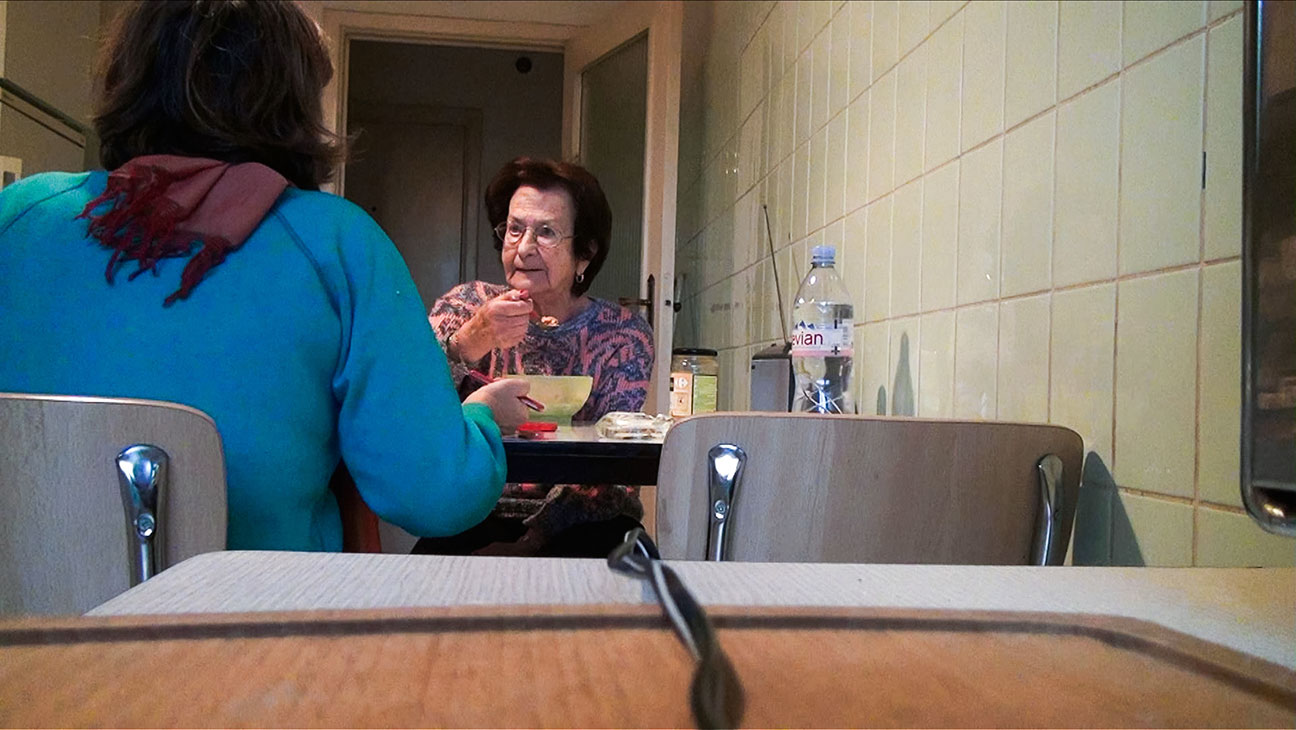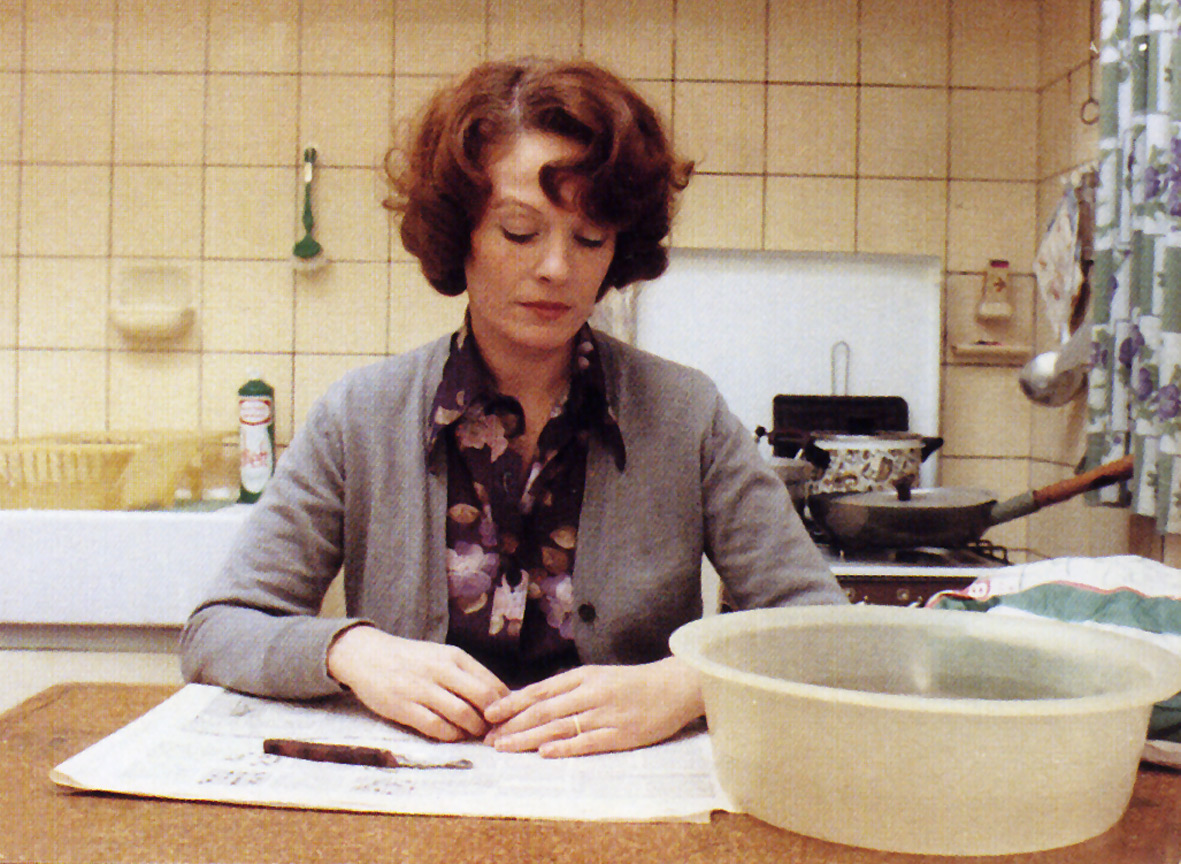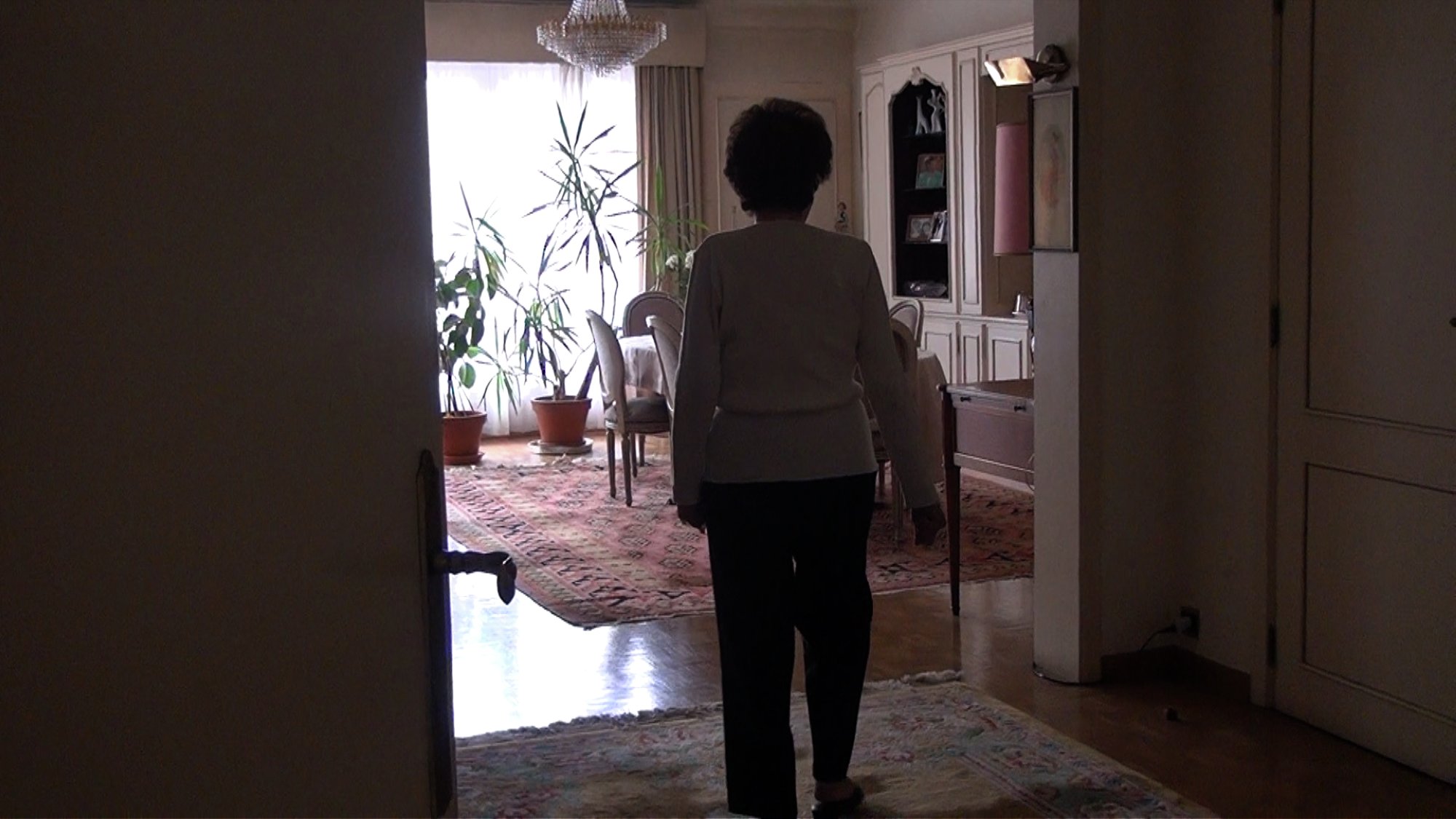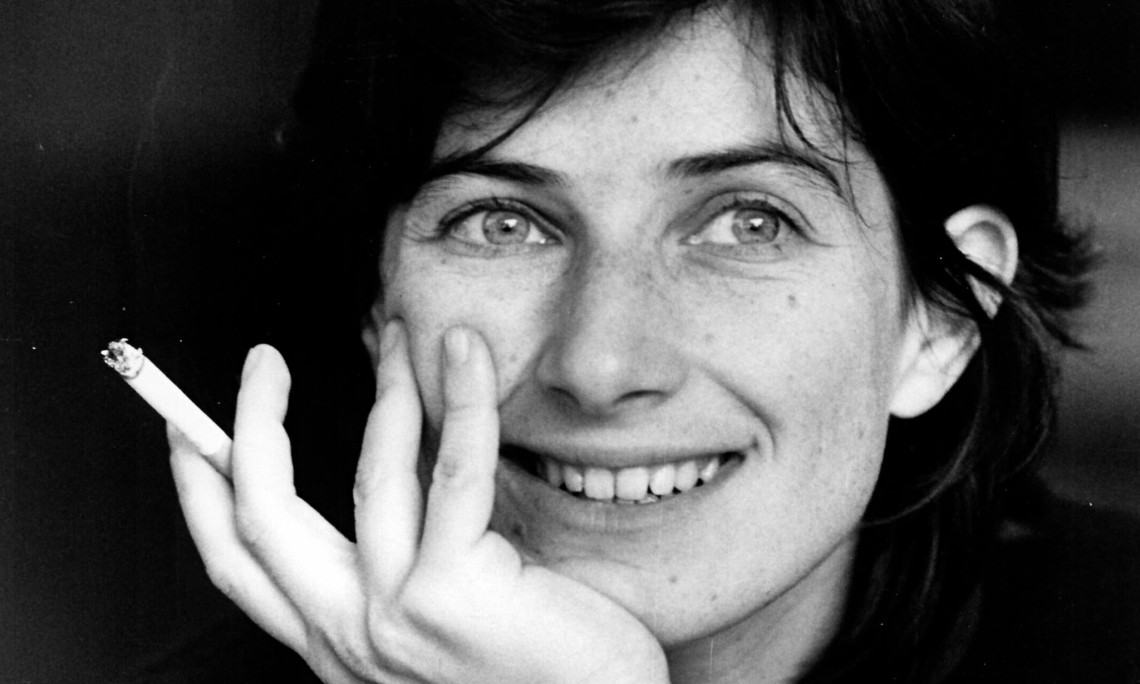The opening frame of Chantal Akerman’s final film No Home Movie is a near-static shot of a barren tree being torn apart by vicious bursts of wind. The old tree doesn’t fall, but you have to wonder how it persists in spite of the surroundings. She holds her camera on this tree for about four minutes, allowing the viewer to feel the passage of time and ponder the reasons why she held the camera on that tree for so long and what it could possibly mean. The image doesn’t necessarily open itself up to easy interpretation—Akerman was never one to make an easy picture—but it informs the type of experience that Chantal’s mother, Natalia, is going through during her final moments of failing health. The tree could also represent Chantal’s displacement. The title “No Home Movie” is blunt in conveying Akerman’s mother as her only place of comfort, but it also ties into her camera. Her lens—ironically most-widely known for the patience of Jeanne Dielman—has in fact never been able to sit in one country for long, as evidenced by documentaries like D’est (1993); South (1999); From the Other Side (2002); and Là-bas (2006), which saw the director move from Moscow to Israel and the United States. Akerman also has trouble staying in one place during No Home Movie, with many scenes of the director at home having conversations in her mother’s kitchen, but frequently being taken away to work on other projects or attend film festivals all over the world. In this way, No Home Movie displays the root of a key element of Akerman’s oeuvre—but it goes beyond the displacement into her more frequent themes of the Holocaust, her relationship with her mother, and the framing of the female body in solitary space.
None of those themes are easily identifiable in a traditional cinematic context, because Akerman is an experimental filmmaker who has rarely given viewers a movie that could be perceived as “Hollywood.” She may have relaxed her rigorous styling in Golden Eighties (1986), A Couch in New York (1996), and Tomorrow We Move (2004), but even those movies call back to important themes in her work. Tomorrow We Move even re-contextualizes frames from Jeanne Dielman for comedic purposes. In that movie the oven doesn’t work, the rooms are a mess and no one even knows how to cook with any level of expertise. Akerman introduces surrogate characters for her mother and herself (a recurring motif) and, in a moment of melancholy, writes both of them happy endings.

Akerman’s body of work rewards exploration, but her compositions reward analysis. The critical narrative around her work is one of difficulty, but Akerman is a director of possibility as long as you enter her world on her terms. Take the opening of Je, Tu, Il, Elle (1974), in which a woman rearranges furniture, writes a letter over and over, removes her clothes and eats sugar. None of these things necessarily correlate into a point-A-to-point-B narrative, but it is evocative of a specific mood that’s also prominent in Jeanne Dielman, The Meetings of Anna (1978) and Toute une Nuit (1982)—one of the (female) private space. The most striking image in Je, Tu, Il, Elle is of a nude Akerman, back arched, sitting in front of a shower. The angles of the wall as well as her back create a beautiful contrast, and the black-and-white image physically deepens because of how she has framed herself. The chasm-like image was not something typically present in movies up to that point, and the ability to show a woman with no window-dressing or perceived intentions about what she should be doing or how she should present herself remains powerful even in today’s cinematic climate. It’s evocative, because she exists purely for herself, away from the male gaze, and in her own defined space.
Je, Tu, Il, Elle, like much of Akerman’s work, could carry the subtitle “A Room of One’s Own.” The interior space of women’s lives is the reason why Jeanne Dielman, her unequivocal masterpiece, exists. In an interview with the Criterion Collection in 2009, Akerman states, “It all came very easily, because I’d seen it all around me. It was in my blood. I made this film to give all these actions that are typically devalued a life on film.” She is, of course, referring to the day-to-day housework conducted by women; Akerman sought out to give these tasks a resonance in cinema. Making the bed, doing the dishes, and preparing meals for men was never something given much mind, especially not in the male-dominated film industry. But with Jeanne Dielman, she pulled the rug out from underneath the male gaze, asking viewers to closely observe what a woman does and thus grasp the confinement of the routines that were expected of women. Akerman cast Delphine Seyrig in the lead because she wasn’t the type of person you normally see doing the dishes. “Men were blind to their wives doing dishes,” Akerman later says in that Criterion interview, “but with Delphine, it would suddenly become visible.” She wanted to equalize women to make a statement that this is something we all are taught with this gender role.

To discuss Jeanne Dielman‘s feminism is to discuss the very nature of the film itself, but it goes beyond the movie and into the production. Akerman wanted the crew to be 80% women. At the time, there weren’t many women working in cinematography or lighting because it was considered a man’s job. These were positions where women weren’t expected to excel, but Akerman wanted to prove that it was possible for women to do any job a man could do when making movies. She succeeded, shooting Jeanne Dielman with the help of an almost entirely female crew, and turning out a masterpiece.
Akerman’s follow-up to Jeanne Dielman is another. News From Home (1977) is a hypnotic sliver of day-to-day life in her adopted home, New York City. This snapshot of how people live and react through the mundanity of simple tasks like riding a subway is a natural successor to her previous New York picture Hotel Monterey (1972), with much of the same visual motifs, such as the long static shots of doors, walls, hallways, and people moving in those spaces. However, the meat of the film is in the letters Akerman reads in voice-over from her mother, and this would later inform their relationship in No Home Movie. Natalia Akerman loves her child. She worries when she doesn’t hear from her daughter for long stretches of time, but she knows that Chantal is trying to make a life for herself in America. Her letters drip with anxiety and melancholy about being detached from her daughter, and by reading them aloud, Chantal presents the bond between mother and daughter down to microscopic details.
Natalia is in Chantal’s lifeblood, and because Chantal makes movies from a place of personal experience or curiosity, Natalia finds her way inside Chantal’s movies as well. News From Home is the most obvious example, but Jeanne Dielman, The Meetings of Anna, Tomorrow We Move and No Home Movie also feature Natalia as a subject or an actor as surrogate. Natalia and Chantal are essentially one and the same. The wide breadth of representation for Chantal and her mother spreads across her filmography from the beginning to the end, and her work functions as a lifetime analysis of the mother-daughter relationship.

Chantal grew up in Brussels to parents who survived the death camps at Auschwitz, a detail that she wrangled with her entire life and career. She rarely waded into identity politics beyond her own filmmaking. She rarely discussed her sexuality or uttered the word “feminism,” though both carry great weight in her work. However, she was cognizant of her status as a Jew. The ghosts of the past, the relatives she lost, her grandparents (Natalia’s parents) who perished in Germany—all of that trickles down into her work. Dis-Moi (1980), a TV movie made up of conversations between Holocaust survivors, was her first foray into tackling the subject head-on, but as good as it is, it’s a limited affair, with a sparse run time and little of Akerman’s visual invention as it more closely resembles a talking-heads documentary. D’est is another story entirely. Built upon lyricism and elegant compositions, the film shows Akerman moving from East Germany through the Baltics after the fall of the Berlin Wall to capture the spirit of the area. Her personal investment shines through, and she captures the lives of Eastern Europeans, herself included, in a moment of reflection on the Berlin Wall, the past, and how to navigate the future. It’s the first in a handful of roving features (South and From the Other Side are two others) where she uses poetic imagery to tell narratives of people who are similarly displaced.
There are two scenes in No Home Movie in which the Holocaust is discussed. In the first, Chantal and her mother are sitting in the kitchen of her mother’s modest apartment. Chantal has prepared food and Natalia wonders if her daughter did something wrong with the dish, but she expresses her approval nevertheless, calling it warm and nourishing They begin to discuss family, much like the letters in News From Home, but eventually the conversation goes back to the Nazis and their treatment of the Jews. Chantal seems contemptuous of every single person who sided with the Germans, but Natalia seems exhausted and deflects the conversation. As difficult as the conversation clearly is for her, she listens to her daughter and weighs in when she can, occasionally disagreeing with something Chantal said or some detail she feels is wrong. In a later scene, Chantal discusses her family with the maid of the house. She’s visibly upset because of her mother’s declining health, and when the maid asks a question about family, Chantal discusses the Holocaust once more, this time blaming the events of the death camps for her mother’s current health and many other things like her lack of a third sibling. This time that anger turns to confusion. Chantal was fluent in the previous conversation, but here she struggles to find her words. If Akerman spent much of her career grappling with these intersecting themes of her mother and the Holocaust, looking for some sort of answer or reconciliation, No Home Movie is the closest she came to giving her films a response to this frequent theme.
In the closing moments of No Home Movie, Akerman ties her shoes, pulls a curtain closed, pushes her hair back out of her eyes, and walks out of frame in silhouette. The film then cuts to a blank room, adorned meticulously in familial symmetry; the camera holds on this image until the film ends. It’s a fitting final image to the career of a pioneer: a woman known for asking audiences to observe women in spaces now showing audiences an empty one—one without Chantal, one without Natalia. An image to tear a hole in the fabric of cinema like she did with her entire career. A hole that will never be filled by another director. In one last gift to the world, Chantal Akerman gave us a portrait of her mother—a woman she loved, a woman who was home for a director who often felt like she didn’t have one.


















2 thoughts on “A Room of One’s Own: The Cinema of Chantal Akerman”
The only film on DVD that I have that I haven’t seen right now is Je Tu Il Elle as I’m saving that for the summer as I’ve been really enjoying her work from what I’ve seen so far. She is so missed at the moment as one of the greats in cinema.
Je, Tu, Il, Elle was actually the first Chantal Akerman film I ever saw. I’m not exaggerating when I say it completely changed how I look at cinema. It began a relationship with a woman who I’d consider to be not only my favourite director, but my favourite artist. It’s not my favourite of Chantal’s movies anymore, but I still hold it dear and I hope that you love it when you eventually get around to viewing that film.